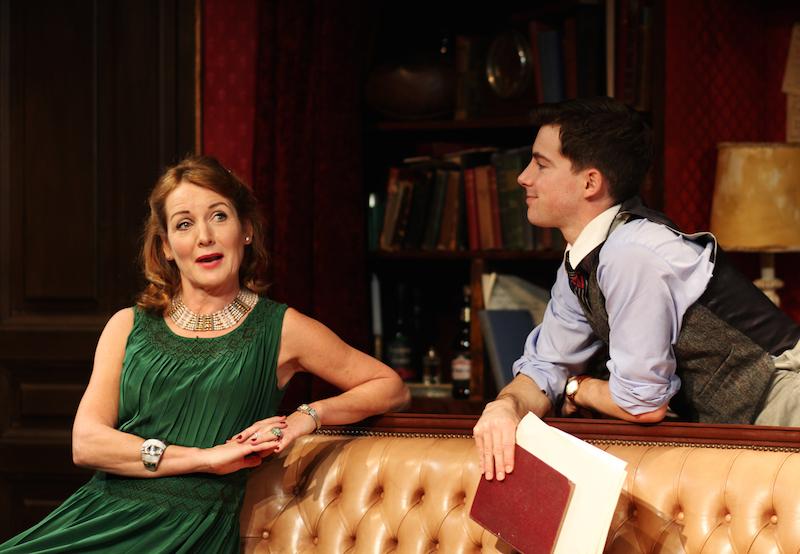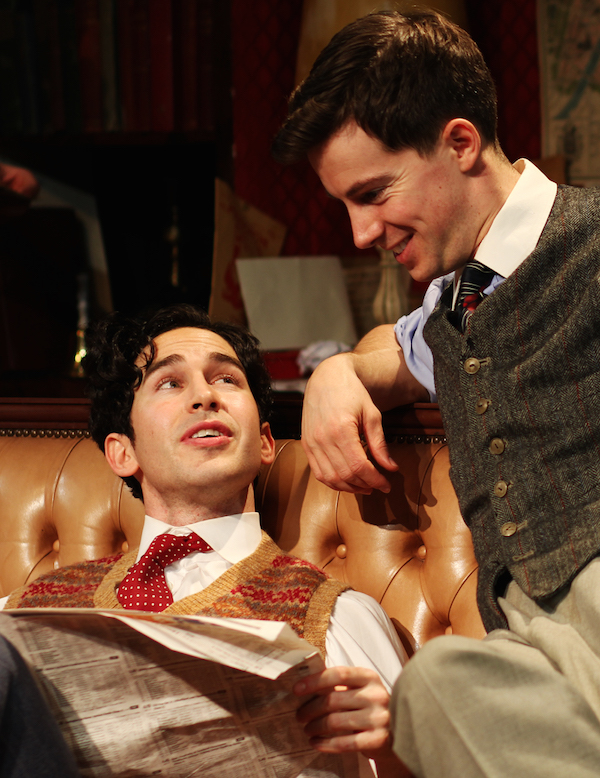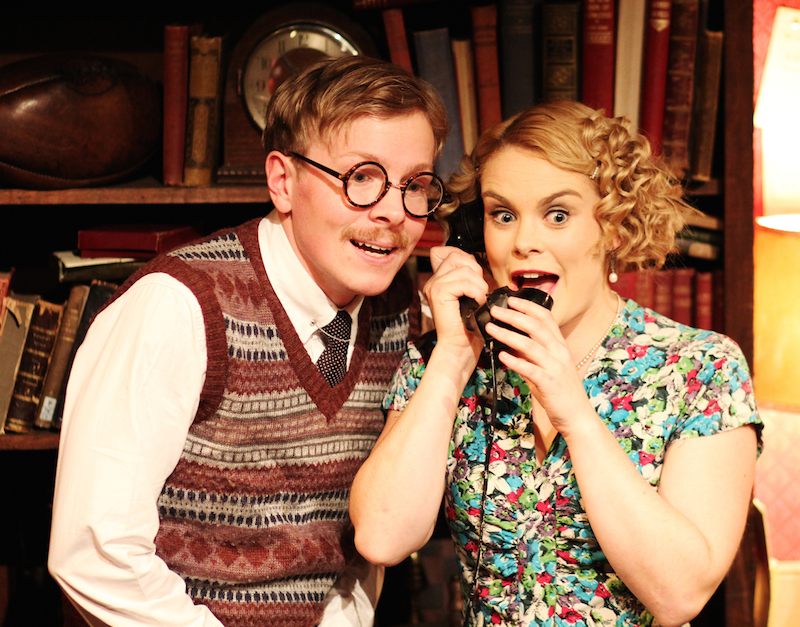First Episode, Jermyn Street Theatre | reviews, news & interviews
First Episode, Jermyn Street Theatre
First Episode, Jermyn Street Theatre
An affectionate revival of Rattigan's lost play hints at greatness to come

Rediscovered work offers aficionados a tantalising piece of the puzzle. Terence Rattigan’s callow debut, reborn after 80 years in obscurity, bears the hallmarks of his later plays, notably closeted ardour and the torment of unequal passion, but is more study than finished painting: ideas sketched, colour yet to be filled in.
 One of those luminaries, the inimitable Peggy Ashcroft, is the model for First Episode’s Margot Gresham (Caroline Langrishe), a fêted film star lured to Oxford by student producer Tony (Gavin Fowler, pictured right with Philip Labey). They begin a doomed affair, sparked at a party thrown by his housemates, unsophisticated Bertie (Adam Buchanan), derisive David (Labey) and jovial Philip (Alex Hope), while Joan (Molly Hanson), Tony’s former flame, is callously passed on to his friends.
One of those luminaries, the inimitable Peggy Ashcroft, is the model for First Episode’s Margot Gresham (Caroline Langrishe), a fêted film star lured to Oxford by student producer Tony (Gavin Fowler, pictured right with Philip Labey). They begin a doomed affair, sparked at a party thrown by his housemates, unsophisticated Bertie (Adam Buchanan), derisive David (Labey) and jovial Philip (Alex Hope), while Joan (Molly Hanson), Tony’s former flame, is callously passed on to his friends.
Rattigan and Philip Heimann, who co-authored the 1933 play aged just 22, write with breathless immediacy, capturing the frailty and brutality of reckless youth. That fevered haste does, however, create myriad dramatic issues; a late swerve into darker territory feels hollow, undercut by perfunctory characterisation.
The miscasting of rather stolid Fowler as charming Adonis Tony compounds the problem. With only a few cursory scenes in which to develop two contrasting intimacies, and no shorthand via palpable charisma, his hold over Margot and David is rendered implausible. Labey does sterling work to weight their subtly amorous exchanges – editor Dan Rebellato reinstated such controversial passages excised by the Lord Chamberlain, honouring Rattigan’s original intentions. Wry Langrishe lacks Margot’s magnetic glamour, which makes her universal adoration puzzling and her great fall more of a stumble.
Buchanan (pictured below with Molly Hanson) proves a comic delight. His naïve, bespectacled Bertie – meta-theatrical symbol of censorship’s overblown moralising – is amusingly hapless while maintaining heartfelt benevolence. Hanson brings irresistible warmth to Joan, who Rattigan doesn’t trouble to imbue with any characteristics other than ditzy and desirable. Gendered double standards are fleetingly probed via David’s misogyny and Bertie’s strictures, yet homosociality is venerated. “The friendship of young men can be very selfish,” observes Margot, whose exclusion leads to a moment of desolation that hints at richer portraits to come, from Hester Collyer to Millie Crocker-Harris.
 Tom Littler’s affectionate revival is packed with period detail, from Emily Stuart’s meticulous costumes to Neil Irish’s treasure trove set, which positions the action in the space between sex-obsessed adolescence and tentative adulthood. Rattigan, now considered more reactionary than revolutionary, shocked with this scandalous portrayal of immoral behaviour among the privileged, yet ultimately conforms to Wilde’s epithet that, in fiction, the good end happily and the bad unhappily; so-called degeneracy, while treated sympathetically, does not go unpunished. An enjoyable first episode, but regular Rattigan viewers know there are superior treats in store.
Tom Littler’s affectionate revival is packed with period detail, from Emily Stuart’s meticulous costumes to Neil Irish’s treasure trove set, which positions the action in the space between sex-obsessed adolescence and tentative adulthood. Rattigan, now considered more reactionary than revolutionary, shocked with this scandalous portrayal of immoral behaviour among the privileged, yet ultimately conforms to Wilde’s epithet that, in fiction, the good end happily and the bad unhappily; so-called degeneracy, while treated sympathetically, does not go unpunished. An enjoyable first episode, but regular Rattigan viewers know there are superior treats in store.
rating
Explore topics
Share this article
The future of Arts Journalism
You can stop theartsdesk.com closing!
We urgently need financing to survive. Our fundraising drive has thus far raised £49,000 but we need to reach £100,000 or we will be forced to close. Please contribute here: https://gofund.me/c3f6033d
And if you can forward this information to anyone who might assist, we’d be grateful.

Subscribe to theartsdesk.com
Thank you for continuing to read our work on theartsdesk.com. For unlimited access to every article in its entirety, including our archive of more than 15,000 pieces, we're asking for £5 per month or £40 per year. We feel it's a very good deal, and hope you do too.
To take a subscription now simply click here.
And if you're looking for that extra gift for a friend or family member, why not treat them to a theartsdesk.com gift subscription?
more Theatre
 Hamlet, National Theatre review - turning tragedy to comedy is no joke
Hiran Abeyeskera’s childlike prince falls flat in a mixed production
Hamlet, National Theatre review - turning tragedy to comedy is no joke
Hiran Abeyeskera’s childlike prince falls flat in a mixed production
 Rohtko, Barbican review - postmodern meditation on fake and authentic art is less than the sum of its parts
Łukasz Twarkowski's production dazzles without illuminating
Rohtko, Barbican review - postmodern meditation on fake and authentic art is less than the sum of its parts
Łukasz Twarkowski's production dazzles without illuminating
 Lee, Park Theatre review - Lee Krasner looks back on her life as an artist
Informative and interesting, the play's format limits its potential
Lee, Park Theatre review - Lee Krasner looks back on her life as an artist
Informative and interesting, the play's format limits its potential
 Measure for Measure, RSC, Stratford review - 'problem play' has no problem with relevance
Shakespeare, in this adaptation, is at his most perceptive
Measure for Measure, RSC, Stratford review - 'problem play' has no problem with relevance
Shakespeare, in this adaptation, is at his most perceptive
 The Importance of Being Earnest, Noël Coward Theatre review - dazzling and delightful queer fest
West End transfer of National Theatre hit stars Stephen Fry and Olly Alexander
The Importance of Being Earnest, Noël Coward Theatre review - dazzling and delightful queer fest
West End transfer of National Theatre hit stars Stephen Fry and Olly Alexander
 Get Down Tonight, Charing Cross Theatre review - glitz and hits from the 70s
If you love the songs of KC and the Sunshine Band, Please Do Go!
Get Down Tonight, Charing Cross Theatre review - glitz and hits from the 70s
If you love the songs of KC and the Sunshine Band, Please Do Go!
 Punch, Apollo Theatre review - powerful play about the strength of redemption
James Graham's play transfixes the audience at every stage
Punch, Apollo Theatre review - powerful play about the strength of redemption
James Graham's play transfixes the audience at every stage
 The Billionaire Inside Your Head, Hampstead Theatre review - a map of a man with OCD
Will Lord's promising debut burdens a fine cast with too much dialogue
The Billionaire Inside Your Head, Hampstead Theatre review - a map of a man with OCD
Will Lord's promising debut burdens a fine cast with too much dialogue
 50 First Dates: The Musical, The Other Palace review - romcom turned musical
Date movie about repeating dates inspires date musical
50 First Dates: The Musical, The Other Palace review - romcom turned musical
Date movie about repeating dates inspires date musical
 Bacchae, National Theatre review - cheeky, uneven version of Euripides' tragedy
Indhu Rubasingham's tenure gets off to a bold, comic start
Bacchae, National Theatre review - cheeky, uneven version of Euripides' tragedy
Indhu Rubasingham's tenure gets off to a bold, comic start

Add comment